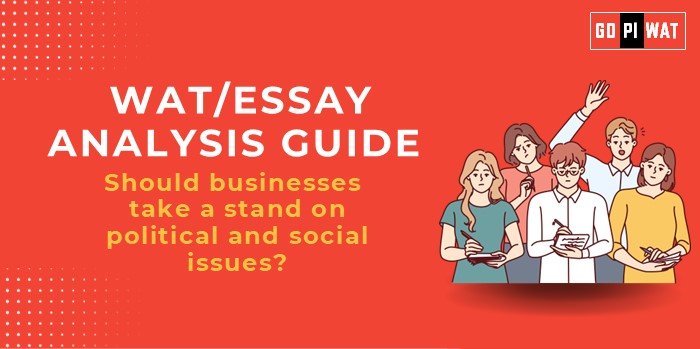📋 Written Ability Test (WAT)/Essay Analysis Guide
🌐 Topic: Should businesses take a stand on political and social issues?
💡 Understanding the Topic’s Importance
Businesses influence economies, culture, and society. Their stance on political and social issues shapes consumer trust, employee retention, and brand perception.
⏳ Effective Planning and Writing
- Time Allocation:
- 🕒 Planning: 5 minutes
- ✍️ Writing: 20 minutes
- 🔍 Review: 5 minutes
- Preparation Tips:
- Identify strong case studies (e.g., Nike, Patagonia).
- Use recent statistics to support arguments.
📄 Introduction Techniques for Essays
- Contrast Approach: “While businesses are traditionally profit-driven entities, modern consumers demand ethical accountability, presenting both risks and opportunities.”
- Solution-Based Approach: “Businesses must adopt strategic frameworks to engage with social issues without jeopardizing stakeholder interests.”
📊 Structuring the Essay Body
- Paragraph 1: Achievements:
- 📈 “Nike’s 2018 Kaepernick campaign increased online sales by 31%, highlighting that supporting causes can resonate with audiences.”
- 🌱 Patagonia’s sustainable initiatives enhance brand loyalty.
- Paragraph 2: Challenges:
- ⚖️ Polarization and Backlash: “H&M faced temporary boycotts in China after addressing human rights.”
- 💸 Investor Pressure: Short-term profit dips concern stakeholders.
- Paragraph 3: Future Outlook: Companies must adopt a balanced approach—address critical social issues strategically to enhance reputation without alienating stakeholders.
🔍 Concluding Effectively
- Balanced Conclusion: “While businesses face risks in taking social stances, aligning purpose with strategy can drive long-term brand loyalty and societal impact.”
- Global Comparison Conclusion: “From Nike in the USA to Unilever in Europe, businesses globally demonstrate that a value-driven approach fosters both societal progress and business success.”
📈 Analyzing Successes and Shortcomings
- Key Achievements: Brand loyalty, customer alignment with ethics, positive societal impact.
- Challenges: Backlash, financial risks, operational hurdles.
- Global Context: Patagonia (USA) vs. H&M (China) shows varying outcomes of public stands.
✨ Recommendations for Sustainable Progress
- 📋 Value-Driven Frameworks: Implement frameworks aligning with stakeholder goals.
- 🔍 Risk Assessment: Conduct risk assessment before public campaigns.
- 🎯 Prioritize Aligned Causes: Focus on causes aligned with long-term brand vision.
✍️ Sample Short Essays
- Balanced Perspective: “Businesses cannot exist in silos. As societal stakeholders, they must support causes that reflect ethical values, but balance is key to maintaining stakeholder trust.”
- Solution-Oriented: “While socio-political stances are risky, companies must adopt strategic, data-driven frameworks to address issues responsibly and ensure long-term growth.”
- Global Comparison: “Nike’s success with social campaigns and H&M’s challenges in China highlight that cultural, geographic, and political contexts shape businesses’ outcomes when engaging with socio-political issues.”


